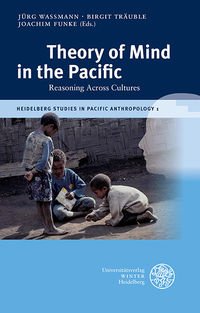 Gerade ist der gemeinsame Band von Jürg Wassmann, Birgit Träuble und mir zum Thema „Theory of mind in the Pacific. Reasoning across cultures“ im Winter-Verlag (Heidelberg) erschienen:
Gerade ist der gemeinsame Band von Jürg Wassmann, Birgit Träuble und mir zum Thema „Theory of mind in the Pacific. Reasoning across cultures“ im Winter-Verlag (Heidelberg) erschienen:
Wassmann, J., Träuble, B. E., & Funke, J. (Eds.). (2013). Theory of mind in the Pacific. Reasoning across cultures. Heidelberg: Winter.
Was lange währt, wird endlich gut! Neben einem Vorwort von Gustav Jahoda sind folgende sieben Kapitel vorzufinden:
1 Human Social Cognition – The Theory of Mind Research (BIRGIT TRÄUBLE, ANDREA BENDER and CHRISTOPH KONIECZNY)
2 Theory of Mind in Tonga: The Onset of Representational Change and False Belief Understanding in Tongan Children (ALEXANDRA TIETZ and SVENJA VÖLKEL)
3 False Belief Understanding in Samoa: Evidence for Continuous Development and Cross-Cultural Variability (ANDREAS MAYER and JULIUS RIESE)
4 Psychology Meets Cultural Anthropology: Interdisciplinary Research with Children in Micronesia (EVA OBERLE and JOCHEN RESCH)
5 Of Biscuits, Soap and Stones. Representational Change and False Belief Understanding among Yupno Children in Papua New Guinea (MIRJAM HÖLZEL and VERENA KECK)
6 Investigating the Understanding of False Belief among the Bosmun of Northeast Papua New Guinea (ANITA VON POSER and BETTINA UBL)
7 Epilogue. Reflections on Personhood and the Theory of Mind (JÜRG WASSMANN and JOACHIM FUNKE)
Beschrieben werden in den einzelnen Kapiteln die Ergebnisse der jeweiligen Feldforschungen zur „Theory of Mind“, die in fünf Gruppen an fünf Orten durchgeführt wurden – und zwar jeweils in Kombination Psychologie und Ethnologie. Das ist ein eher ungewöhnliches Vorgehen, da die Ethnologen meist allein im Feld zugange sind. Genau auf diese gelebte, praktizierte Interdisziplinarität sind wir (neben den interessanten Ergebnissen) ein wenig stolz! – Aus dem Klappentext:
„This book is the result of intensive collaboration between anthropologists and psychologists in the field of cross-cultural research on social cognitive development. Five interdisciplinary research teams, coming from the University of Heidelberg, were investigating five Pacific Island societies. All together, they were interested in the question of how and when children in these different cultures come to assign mental states to others. The ascription of desires or beliefs to other people is a milestone of human sociality. It allows us to understand, explain, and predict human behaviour. During the last years, research on children’s knowledge about the mental world, better known as theory of mind research, has become a central topic in developmental psychology and the role of cultural impact is subject of various theoretical yet hitherto few empirical accounts.
This unique research project combines sound ethnography of different Pacific cultures with thoroughly conducted experimental work, done by developmental psychologists; it presents a shared, thoughtful analysis of the results and provides deeper insight into current debates on the ontogeny of theory of mind competencies.“
[siehe auch meinen früheren Blog-Eintrag von 2008 zu diesem Thema]
siehe auch die Rezension von Eller, Jack David 2014:
Review of Theory of Mind in the Pacific: Reasoning across Cultures. Anthropology Review Database March 15, 2014. http://wings.buffalo.edu/ARD/cgi/showme.cgi?keycode=5872, accessed March 18, 2014.
siehe auch die Rezension von Luhrmann 2015:
Luhrmann, T. M. (2015). Theory of Mind in the Pacific: Reasoning Across Cultures, edited by Jürg Wassmann, Birgit Träuble and Joachim Funke. Anthropological Forum, 1–2. doi:10.1080/00664677.2015.1076590 -> „This is a remarkable book. It represents a quite considerable amount of work and it is a significant achievement. There is nothing like it in the literature.“ Das hört man gerne!